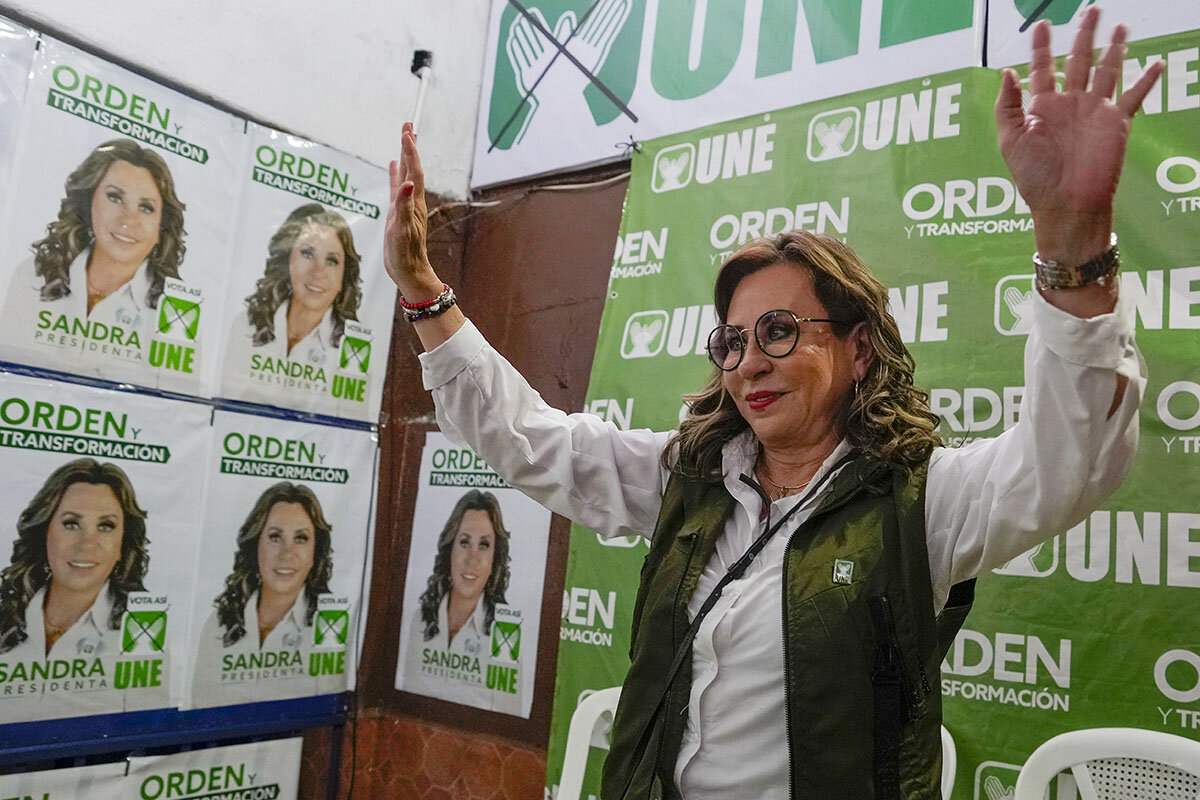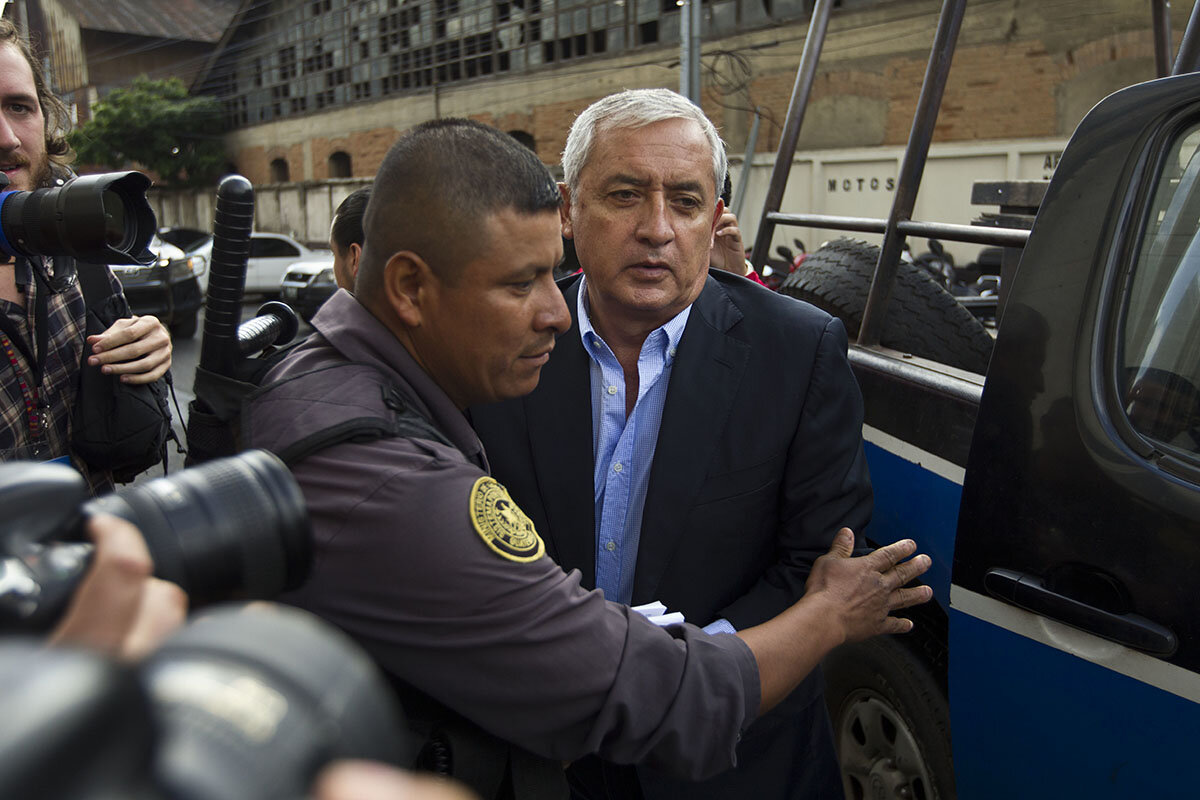In Guatemalan elections, a reformist’s first challenge: Getting to run
Loading...
| Mexico City
In the first round of Guatemala’s presidential election on June 25, a relatively unknown anti-corruption candidate won enough votes to go through to the runoff.
Bernardo Arévalo’s advancement was a huge surprise – but that paled in comparison with what came next.
The same day that the first-round results were certified, a criminal court suspended Mr. Arévalo’s political party, Movimiento Semilla, throwing his candidacy into question and the nation into political crisis. The move galvanized a disillusioned population (null ballots had outstripped all the candidates in the first round), propelling Guatemalans onto the streets in protest.
Why We Wrote This
Guatemala’s fragile democracy is on a knife-edge, as a prosecutor of dubious impartiality challenges a surprise reformist presidential candidate’s legitimacy.
What’s going on?
This presidential election has further weakened Guatemala’s already fragile democracy. In the lead-up to the vote, several candidates seen as threats to the business and political establishment were disqualified, on shaky grounds, from running.
Mr. Arévalo, an academic and former diplomat, defied the polls by winning 11.8% of the ballots, coming in second behind former first lady Sandra Torres. He is the son of Juan José Arévalo, the country’s first democratically elected president, who took office in 1945, following the Guatemalan revolution. Many expect that if he won, he would continue his father’s legacy of investing in social programs, but critics paint him as an extreme leftist and loudly protested his advancement.
The prosecutor who brought the case against Mr. Arévalo’s party, accusing it of fraud in gathering the signatures required for its foundation in 2019, is under U.S. government sanctions for having allegedly blocked corruption investigations in the past. The prosecutor’s new move is widely seen as politically motivated.
The electoral tribunal, however, refused to comply with the criminal court’s order to suspend a political party active in an election. “If there is no respect for the vote, there is no democracy,” the tribunal said on July 13. Mr. Arévalo said he would not obey the order, and his rival, Ms. Torres, suspended her campaign in solidarity.
The Guatemalan prosecutor’s office later said it would continue to investigate how the anti-corruption party was registered, but that its actions were not intended to interfere with the runoff scheduled for Aug. 20.
“Anything can happen between now and the runoff,” says Byron Morales Dardón, a political analyst and researcher at Rafael Landívar University in Guatemala City. Those in power “are interested in stopping any possibility of real change. What happens next will really depend on social mobilization. Citizens have to show they won’t stand for” meddling in the democratic process.
How did Guatemala get here?
A lack of judicial independence has been at the heart of Guatemala’s recent turmoil. While lower court judges go through rigorous selection processes, those on some of the highest courts are essentially political appointees, some hand-picked every five years. “There is a system set up that favors impunity and corruption,” says Claudia Escobar, a legal scholar and visiting professor at George Mason University, where she co-directs a fellowship program for democracy defenders and anti-corruption activists.
“We don’t have a Daniel Ortega or Maduro,” she says, referring to Nicaraguan and Venezuelan autocratic leaders. “What we have is a dictatorship of corruption.”
But isn’t Guatemala known for its dedicated fight against corruption?
Yes – kind of! A United Nations-backed anti-corruption commission known as CICIG, founded in 2006, became the envy of many regional neighbors struggling with impunity and serious crime. But some felt CICIG went beyond its mandate, and when investigations started implicating economic, military, and political elites, the program was not renewed. It expired in 2019.
Four years earlier, Guatemalans had risen up in outrage over political corruption, leading to the ouster of then-President Otto Pérez Molina. “What happened in that case – and it can happen again – was that there wasn’t any structural change,” says Ms. Escobar, a former judge who sought protection in the United States after reporting official interference in the judiciary. “The president resigned, there were fresh elections, and [a new president] started his term with an intention to reform the constitution,” she recalls.
“Everyone knew the constitution needed to be reformed for the judicial system to work,” she adds, but Congress looked away.
Guatemala cannot afford another missed opportunity, democracy analysts warn. Voter turnout was not especially high this year, Mr. Morales says, but citizens seemed to wake up when the first-round election results were announced. “It stimulated a series of reactions. An unexpected player in the runoff offered the possibility of a new moment for the country. It generated some optimism,” he says.
But the move to disqualify Movimiento Semilla – and the implication that Mr. Arévalo could be barred from running – “generated a new level of indignation around the manipulation of the law,” Mr. Morales says. “It’s anger over what looks like the sacrifice of a nation’s democracy for personal gain.”
What’s at risk?
Guatemala is a major source of migrants to the U.S. Political instability and knock-on effects such as a lack of access to public services are root causes of migration.
Regionally, there has been a shift toward authoritarianism: Nicaraguan President Daniel Ortega has exiled his loudest opponents, while in El Salvador, President Nayib Bukele’s supporters have overridden a constitutional ban, enabling him to run for reelection.
Already, Ms. Escobar feels, Guatemala has taken note of events in places like Nicaragua, where she says the message has been “if you’re in power, whatever you do, don’t lose control.”
Mr. Morales agrees. “This is a political dispute that could determine where the country goes in the long term,” he says. It could reaffirm “the enormous political and economic powers that seek ... continuation of the old order of inequality and social injustice,” he says, or it could “possibly reactivate Guatemala’s process of democratization.
“That’s the big question – everything is in play.”










